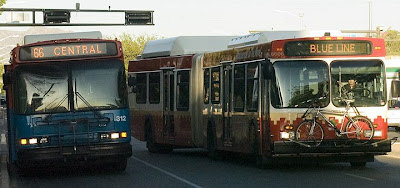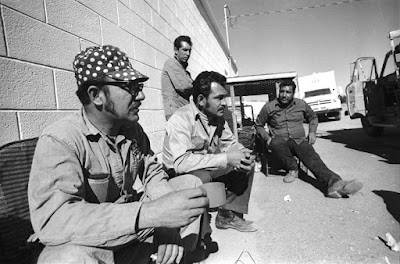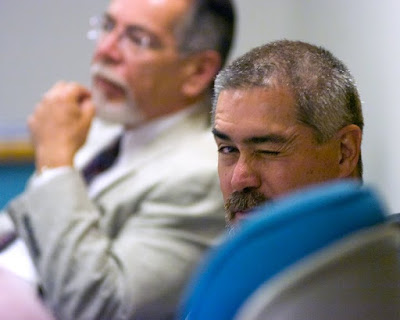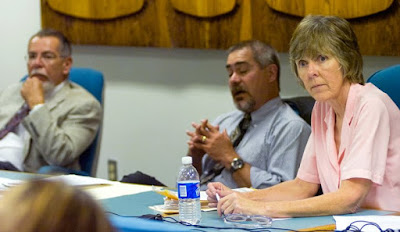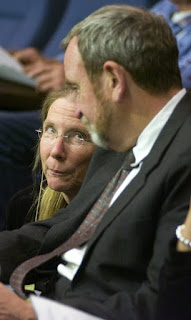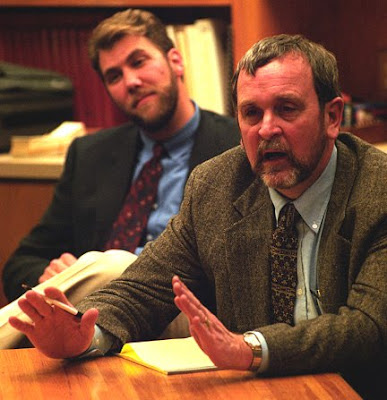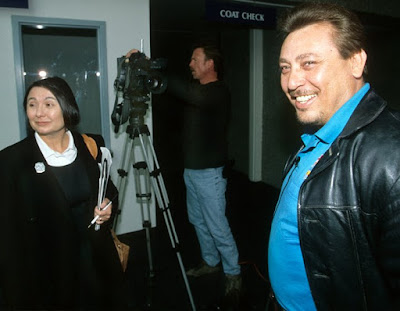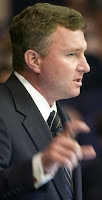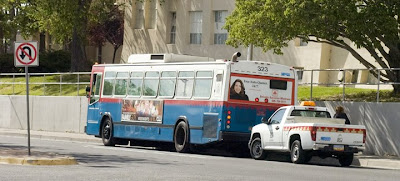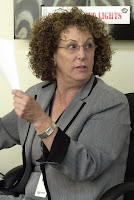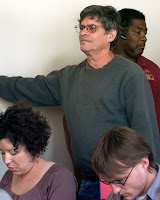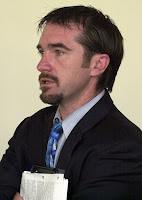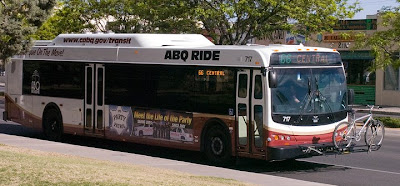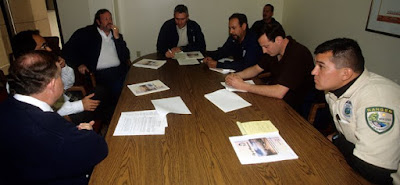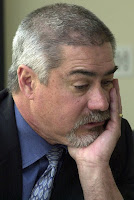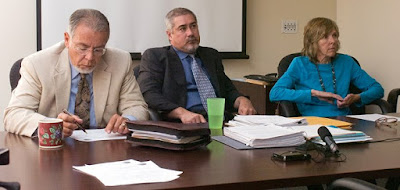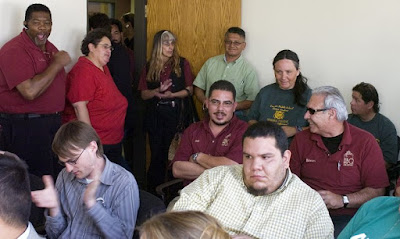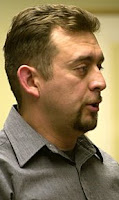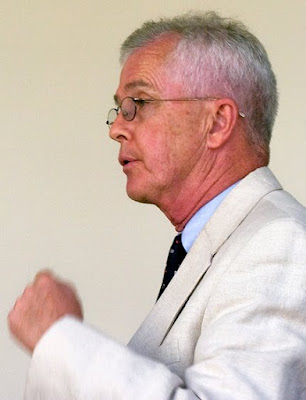When angry count to ten before you speak. If very angry, count to one hundred.So, …998, 999, 1,000! Now I write.Thomas Jefferson

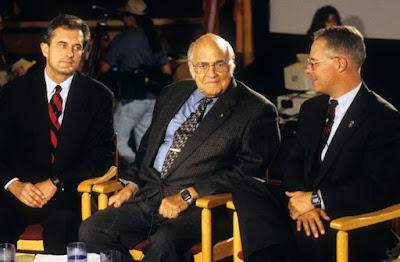 Former Mayor Harry Kinney, center, was Albuquerque’s first chief executive when the commission-manager form of city government was replaced with a council-mayor in 1973. He was also the city's third mayor, elected again in 1981, after David Rusk served one-term.
Former Mayor Harry Kinney, center, was Albuquerque’s first chief executive when the commission-manager form of city government was replaced with a council-mayor in 1973. He was also the city's third mayor, elected again in 1981, after David Rusk served one-term.He passed away two-years ago. The Civic Plaza and the Mayor’s Conference Room are named in his honor.
One of Kinney’s last acts of public service was when he accepted an appointment by Mayor Martin Chávez, right, to sit on the City’s Ethics Board, specifically to hear the complaint against Chávez in the ABQPAC issue.
The man on the left is David Campbell. He was then City Attorney when this picture was taken November 7, 1997, while the three commented about the City election returns for government access cable channel GOV 16.

I was in the Mayor Harry Kinney Memorial Conference Room on Friday May 9, for a news conference where Chávez was to unveil an ordinance change called, “The Ethical Public Service Act.” The legislation is based on a November 2007 report of “the Albuquerque City Ethics Coalition.”
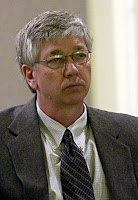 Members of the press gathered, with camera crews representing the four local television affiliates: KOB 4, KOAT 7, KRQE 13, and KLUZ 41. Radio news KKOB 770 and the Albuquerque Journal were also present. The city’s GOV 16 dutifully attended to record and to cablecast and recast and recast the event.
Members of the press gathered, with camera crews representing the four local television affiliates: KOB 4, KOAT 7, KRQE 13, and KLUZ 41. Radio news KKOB 770 and the Albuquerque Journal were also present. The city’s GOV 16 dutifully attended to record and to cablecast and recast and recast the event.A small parade of the Mayor’s regulars came and went from the conference room starting with the First Dog Dukes, who had to sniff everybody before leaving. Parks and Recreations Director Jay Hart, above left, stuck his head into the room and we made eye contact before he left.
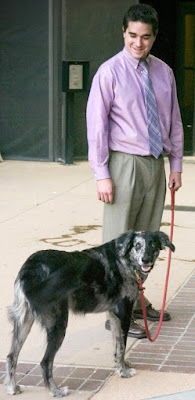 The Mayor’s staffer, Tony Pedroncelli, above, is the former field director and deputy campaign manager for Chávez‘ 2005 re-election campaign. He currently is the legislative coordinator and is also one of Dukes' dog walkers.
The Mayor’s staffer, Tony Pedroncelli, above, is the former field director and deputy campaign manager for Chávez‘ 2005 re-election campaign. He currently is the legislative coordinator and is also one of Dukes' dog walkers.The Weekly Alibi’s contributing writer Jim Scarantino in the July 28 - August 3, 2005 issue, wrote in,
“Rules of the Knife Fight” that:
Chavez has unleashed an attack dog in his new campaign field director, Tony Pedroncelli, who once sought work on Eric Griego's campaign. Now he's lashing out at both Winter and Griego. Chavez is hoping Pedroncelli can pierce Winter's image as a reasonable and generally trustworthy fellow, but it so far hasn't worked. Chavez may have no choice but to personally attack Winter's character, again exposing himself to a counterthrust he might rather avoid.Nearly 15 minutes after the scheduled start time for the news conference, Albuquerque Police Department's Mayor’s Detail Detective Aaron Holmes approached and asked me to step outside to the lobby. He told me that I had to leave.
As I stepped into the lobby, there were three uniformed city security guards waiting. I asked Holmes why I would have to leave? He said you know why, “You have a history of confronting the Mayor.” I told Holmes that I had never confronted the Mayor.
I informed Holmes I had a digital recorder on the podium and he escorted me back to the conference room where I recovered my equipment.
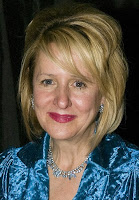 Walking back I asked him if he recognized me as an accredited member of the press. He said he did.
Walking back I asked him if he recognized me as an accredited member of the press. He said he did.I asked to speak to the Mayor’s Communications Officer Deborah James, left. Holmes said she wasn’t present and she would contact me later. I received no call from James.
I asked under whose orders was I being ejected. Holmes said, "higher-ups." I had to repeat the question several times and specifically ask for the name of the person. He said it was his sergeant. I still had to ask for the name before he said it was Sgt. Louie Sanchez. He went on to say that, “As a former police officer, you know the order probably came from higher-up.”
 Holmes and the three security guards, in this triptych, escorted me to the elevator and as I raised my camera to photograph the officer, he quickly turned and reentered the hallway leading to the Mayor’s office. I rode down the elevator with Captain Mike Archuleta, right, who got off the elevator on the first floor, while I continued to the basement. The other two guards, Erasmo Torres, left and Bill Ortiz, center, dropped back once we got to the parking garage, but shadowed me until I drove off.
Holmes and the three security guards, in this triptych, escorted me to the elevator and as I raised my camera to photograph the officer, he quickly turned and reentered the hallway leading to the Mayor’s office. I rode down the elevator with Captain Mike Archuleta, right, who got off the elevator on the first floor, while I continued to the basement. The other two guards, Erasmo Torres, left and Bill Ortiz, center, dropped back once we got to the parking garage, but shadowed me until I drove off.So what’s wrong with this picture?
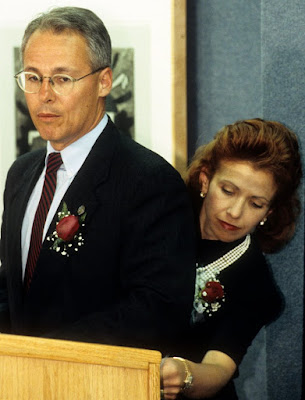 Mayor Chávez announced Nov. 7, 1997, above, that he would not seek reelection after his first term in favor of seeking the Democratic nomination for governor. His wife, Margaret Aragón de Chávez, reaches behind his back for something on the podium shelf.
Mayor Chávez announced Nov. 7, 1997, above, that he would not seek reelection after his first term in favor of seeking the Democratic nomination for governor. His wife, Margaret Aragón de Chávez, reaches behind his back for something on the podium shelf.It is photographs like this one that may be the basis for the Mayor’s contention that we have been in confrontations.
If photographing him and publishing his image when he becomes emotional, contrary to how he thinks he should be perceived in the press, is confrontational; then I guess I am. However, I don’t get in his face. He has on several occasions walked into my space. My response is to photograph him. It’s what photographers do.
 Here are a dozen images I provided and were published by New Mexico Politics with Joe Monahan. Chávez should have little to complain about. Monahan uses my working political portraits because he believes that they represent, more accurately, the real person than do the formal campaign handout pictures.
Here are a dozen images I provided and were published by New Mexico Politics with Joe Monahan. Chávez should have little to complain about. Monahan uses my working political portraits because he believes that they represent, more accurately, the real person than do the formal campaign handout pictures.Chávez has chosen to engage in "prior restraint." That is keeping a member of the press from either reporting or publishing details of news which he does not like. He had me removed to prevent the possibility of being seen for how he actually looks, while conducting public business.
I don’t tend to cover the “good things” that happen in city government for a few reasons:
I didn’t get the images of the Mayor as he spoke about a very serious issue – ethics reform.I expect my government to do good. We all pay hard earned dollars in taxes for government to get it right. I don’t need to praise them to do so.
News is seldom all smiles; news tends to be serious stuff.
There are too many other serious problems that need addressing. There is little time for “happy news.” If that’s what my readers seek, your going to get the return of the hummingbird and its life and death struggle over the survival of her eggs with the squirrel, or you can go to lightweight feature fluff pieces on local TV news.
I will analyze the "Albuquerque City Ethics Coalition November 2007 report" and “The Ethical Public Service Act” in a future blog.
At first blush, three-quarters of the ordinance seems fairly reasonable and workable. There are a few problems, more related to silly proposals for the mayor to avoid doing his job in managing his administration. Nothing proposed is so serious that it can’t be changed and if it isn’t changed now, it will be in the future.
The Ethical Public Service Act imposes seven values on public servants. Employees must be: honest, fair, respectful, compassionate, responsible, accountable, and loyal.
The Mayor, by ordering me removed from his news conference, had to violate several of the seven values.
I have only spoken with Chávez once; it was before his first election. The communication between us couldn’t have been more than a few sentences long.
I have never asked Chávez a question at a press conference, or anywhere else. I have addressed him indirectly, through my writings, by speaking before the council, and at various committees, boards and commissions. I have always been rather outspoken in my advocacy of employees and I had been involved with the police union for almost 10 years when he first came on the city government scene.
There are several major events that clearly must have upset Chávez:
When he first became Mayor in 1993, Chávez fulfilled a campaign promise to get more officers on the street by eliminating specialty assignments in the police department. I held what he considered a "closet job" in the video productions unit.I helped lead the defeat of a quarter percent “Public Safety Tax,” in 1999.
I did some of the investigative and para-legal work for one of the complainants in the ABQPAC's ethics charges. Chávez was tried before the City’s Ethics Board and found guilty of violations of the City Charter’s ethical requirements against taking money from city employees and those doing business with the city, and
I provided photographs and video documentation for then City Council President Brad Winter’s mayoral campaign against Chávez. I've since chosen to not participate in negative campaigning.
My assignment, based on my education and experience, was to develop video training to be disseminated to officers at briefings. Using video helped reduce the need to bring officers from their daily routines to attend state-mandated advanced training and allowed for the classroom training to be tailored to issues that might be better suited with face to face instruction. I was an advanced training instructor with specialized technical skills.
I had to fight to get into the video unit. I was initially denied the assignment, but I challenged the selection process and exposed it, as flawed and unfair. To preempt the possibility of being sued, the Police Department offered me a settlement, which included, being permanently assigned to the video unit.
 Here I am, center, on the set of the Law Enforcement Television Network where I was a guest and contributor, while I was assigned to Video Productions unit. Tom Park, left and 1983 Miss America, Debbie Maffett, right, hosted the daily "Roll Call" show for LETN.
Here I am, center, on the set of the Law Enforcement Television Network where I was a guest and contributor, while I was assigned to Video Productions unit. Tom Park, left and 1983 Miss America, Debbie Maffett, right, hosted the daily "Roll Call" show for LETN.In the interim, City doctors had determined that due to a series of injuries to my back, I could no longer work patrol. Instead of leaving me in the Academy training role, I was reassigned to a civilian job as a records clerk. The video settlement contract was ignored. About three years later, when there was a new Mayor and Chief, I was reinstated to my former video position.
I have editorially taken Chávez to task on numerous issues, which you may read, through my archived articles found on The Blue Flyer.com.
I have also repeatedly written about Chávez on this site; most notably:
Mayor Calling for Conflict of Interest
We Don’t Need No Stinking Ethics Reform
Obscured Transparency
September 18 Council Brief J-School
Goodbye ABQPAC, Hello, What Do You Call Yourself?
100th Blog
Million Dollar Recruiting
News Flash! Budgetary Update!
Bald-Faced Hypocrisy!
Strange News Day at the Tribune
Whose Who?
Under the Bus
Repetition of a Lie
Some Things Just Are Black and White
Political Corral Getting Crowded
Another Week in the Political Tumbler
2007’s Top Stories
ACLU Is On the Loose
The Circus Came to Town
New Mexico Goes to Clinton
They’re Back!
STOP!

The anonymously posted “Eye On Albuquerque” regularly takes on Chávez, Chief of Police Ray Schultz and the Deputy Chiefs. The eye seems to have greater insight to city operations than I have and it excoriates them. The Eye has a very active comment section that often is out of control. Most of the postings, on what I call “the backside,” are anonymous. Many engage in libel and defamation. The Eye is somewhat callous about their responsibility, as the publisher, in hosting what they must know are illegal acts.
There is a widely held misperception that free speech covers all comments made as political speech from possible criminal and civil prosecution. It’s not true. Though much of what might be said is protected, there are areas where some on the Eye’s backside cross into the illegal. Just because the current technology makes it difficult to identify these posters does not make their comments legal. I don’t propose chasing them. Most who read the comments, recognize the outrageousness for what they are and give them no credence.
It seems the Mayor and Police administrations are unhappy with the comments and wish to identify the Eye and some of those commenting.
Current and former members of the City Council, administration and officers have asked me if I am the Eye. I am not and even the Eye posted a disclaimer.
It seems there are some in the local law enforcement community who believe that the Eye, or someone on the backside, made a threatening statement about Chávez.
It further seems, from reading the backside of the Eye, that the same law enforcement officials are bound and determined to establish the identity of the Eye and those commenting in an effort to stifle their criticism.
Apparently I am suspect.
The conventional wisdom is; officers are short on probable cause for either subpoenas or search warrants.
Of course that doesn’t mean that officials have abandoned their search.
Do any of these folks who believe that I might be the Eye, read our work side by side? The Eye and I disagree on some very fundamental issues, such as:
However, the Eye does agree with me on several points, specifically, the STOP ordinance, which uses cameras to catch vehicles running red lights or speeding and not providing proper due process.Enforcement of Federal Immigration laws by local law enforcement;
Posting unverifiable internet information like the “Statistical Report on Undocumented Immigrants;”
Unpopular convictions for the criminal activity of;
The UNM student’s destroying the Mexican flag;
The sentencing of an auto burglary victim who plead guilty to manslaughter for shooting the alleged offender in the back while he tried to escape;
The meaning of “THIS NOTE IS LEGAL TENDER FOR ALL DEBTS, PUBLIC AND PRIVATE,” as it applies to payment for housing and complying with the federal Fair Housing act, when a downtown motel refused to rent to anyone without a credit card to keep street people out;
Though I didn’t post, the Eye and I have also disagreed in e-mails on the question of the State’s Human Rights Hearing Officer finding a photographer guilty of illegal discrimination for refusing to accept a client based on sexual orientation;
We also disagreed that morale at APD couldn’t get worse. I wrote the Eye, “As bad as it is, don't underestimate how bad it still can get.”
I first posted March 28, 2006. The Eye came on the scene Dec. 11, 2006.

Analysis
Ethics is best learned from life-long experiences taught by family, friends and mentors. If not learned through those intimate and personal relationships, it’s not too late to learn through education and experience.
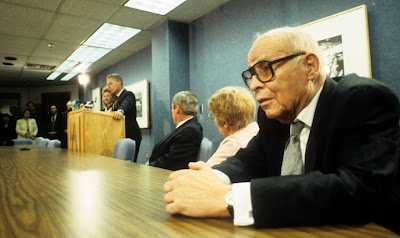 This is Martin Chávez’ father, Lorenzo Armijo Chávez, right. In the published obituary account, he was considered a good lawyer. After his son was elected mayor, Lorenzo Chávez warned his son away from a financial scheme called “the Breakfast Club.” It was designed to funnel money to defray cost of the mayor’s wife accompanying him on trips out of town. Lorenzo Chávez warned his son to get away from the scheme, which he did.
This is Martin Chávez’ father, Lorenzo Armijo Chávez, right. In the published obituary account, he was considered a good lawyer. After his son was elected mayor, Lorenzo Chávez warned his son away from a financial scheme called “the Breakfast Club.” It was designed to funnel money to defray cost of the mayor’s wife accompanying him on trips out of town. Lorenzo Chávez warned his son to get away from the scheme, which he did.During Chávez’ second term as mayor, he partook of a continuing campaign fund raising scheme that grew into the ABQPAC. The Mayor apparently didn’t learn the lessons of ethical behavior at his father’s knee.
The Albuquerque Journal in an editorial, “City Takes Lead Again, This Time on Ethics,” in supporting the ordinance stated,
Chávez has plenty of critics, including many who would scoff at him being a champion of ethics. But this is a visionary proposal that should have a positive impact long after the mayor has left office — much like his work to make government information as accessible as possible to the public.The Journal’s claim that the mayor has worked on making, “government information as accessible as possible to the public,” is hollow.
I have made several requests under the state’s Inspections of Public Records Act in the past year or so.
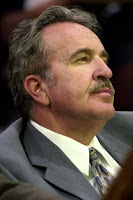 I have not been allowed to inspect any document pertaining to the negotiations between City of Albuquerque and Frontier Airlines regarding international flights to and from the Sunport and Puerto Vallarta, Mexico, as announced by Mayor Martin Chávez on Fri. Aug. 3, 2007.
I have not been allowed to inspect any document pertaining to the negotiations between City of Albuquerque and Frontier Airlines regarding international flights to and from the Sunport and Puerto Vallarta, Mexico, as announced by Mayor Martin Chávez on Fri. Aug. 3, 2007.Director of Aviation Department Nick Bakas, left, assured me, when we talked at a City Council meeting, that he would respond to the request for the Frontier Airlines contract. It has been almost a year since he said he would provide the document, but he hasn't.
I made the request to try to determine if the City had violated the State Constitution’s Anti-Donation Clause.
Neither the state, nor any county, school district, or municipality, except as otherwise provided in this constitution, shall directly or indirectly lend or pledge its credit, or make any donation to or in aid of any person, association or public or private Corporation...Anti-donation clause of Article IX, Section 14 of the State Constitution.
Frontier Airlines announced this past week that they were suspending the Puerto Vallarta flights, while Gov. Bill Richardson brokered a deal with AeroMexico for flights to Cuidad Chihuahua, Mexico.
 I requested all information from the zoo and the Mayor’s office in the city’s attempt to acquire two Pandas from the Chinese government. Biological Park Director Ray Darnell allowed me to review the Zoo’s records, however, the Mayor’s office did not respond to repeated requests to see their records and travel documents.
I requested all information from the zoo and the Mayor’s office in the city’s attempt to acquire two Pandas from the Chinese government. Biological Park Director Ray Darnell allowed me to review the Zoo’s records, however, the Mayor’s office did not respond to repeated requests to see their records and travel documents.I requested information from the Planning Department Director Richard Dineen, on the membership of an Ad-Hoc committee formed to work on ordinance proposals for business signs.
 Dineen, above left, seen here taking down information from a citizen who complained to City Council that he could not get an answer from the Planning Department, later took my information, about my ignored request, but he never got back to me.
Dineen, above left, seen here taking down information from a citizen who complained to City Council that he could not get an answer from the Planning Department, later took my information, about my ignored request, but he never got back to me.Yes, I am a critic; yet my criticism is not without basis. In the two years this site has been up, I have posted 56 entries with Mayor Martin Chávez’ name in them. That is about a quarter of my blogspots. Though I write quite a bit about the mayor, not all I write is critical of him. More often than not, he does not generate a response from me. It must mean he’s doing most things right, most of the time.

My Take
During my 24-plus years with the city, I served under each of the six Mayors: David Rusk, Kinney’s second term, Ken Schultz, Louie Saavadera, Chávez’ first term, and Jim Baca. Of these men, Kinney was the most open and to my perception the most ethical and Chávez, the worst. This is in the face of Schultz, who has agreed to plead guilty in the federal corruption case surrounding an alleged Bernalillo County Metropolitan Courthouse construction kickback scheme.
 If there were any truth to the Mayor’s allegation that I threatened him, or took a swing at him, wouldn’t one of his bodyguards have stepped in? There is neither a police report nor a restraining order. Why? Because it is a crime to file a false police report and a restraining order is only temporary. To get a permanent injunction, Chávez would have to swear under oath to his allegations at a hearing in an open courtroom. He can’t do that, because he knows the truth and he can ill afford to have the truth bantered about. That’s why he simply has me arrested and ejected, but not charged.
If there were any truth to the Mayor’s allegation that I threatened him, or took a swing at him, wouldn’t one of his bodyguards have stepped in? There is neither a police report nor a restraining order. Why? Because it is a crime to file a false police report and a restraining order is only temporary. To get a permanent injunction, Chávez would have to swear under oath to his allegations at a hearing in an open courtroom. He can’t do that, because he knows the truth and he can ill afford to have the truth bantered about. That’s why he simply has me arrested and ejected, but not charged.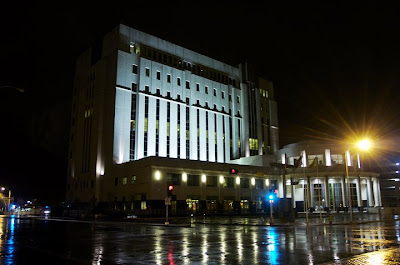 In a New Mexico Independent two-part article by Barbara Armijo, on architect Mark Schiff, who has agreed to plead guilty to federal charges in the Bernalillo County Metropolitan Courthouse construction kickback case, “Albuquerque Mayor Martin Chavez has not commented on Welsome's story, saying through a spokeswoman that he wasn't going to start responding to ‘blog posts.’"
In a New Mexico Independent two-part article by Barbara Armijo, on architect Mark Schiff, who has agreed to plead guilty to federal charges in the Bernalillo County Metropolitan Courthouse construction kickback case, “Albuquerque Mayor Martin Chavez has not commented on Welsome's story, saying through a spokeswoman that he wasn't going to start responding to ‘blog posts.’"A couple of years ago, Chávez opened his own blogspot on the City’s website. He extolled the virtue of technology and promised to stay in touch with the community and would respond to questions and comments made to his site. He only wrote a couple of pieces and like everyone else who blogs finds out, it takes real work. Then his blog stayed dormant before it just went away. At one point, even the First Dog Dukes had his own blog spot.
If Chávez refuses to recognize or respond to blog posts, then why does he worry so much or fear what bloggers write?
Could it be that the mayor is more worried of me, not because he physically fears me, but because he fears that the Eye and I might expose his mischievous ways. He goes well beyond bloggers; he eliminates freelancers and staffers of magazines and other publications printed on dead tree products.


